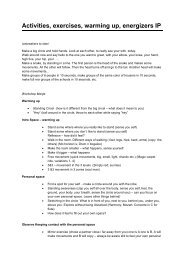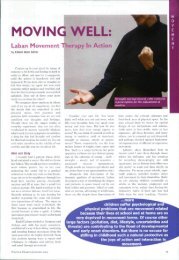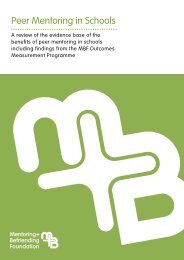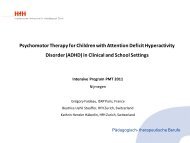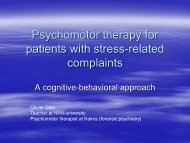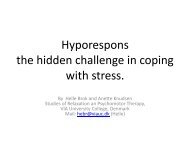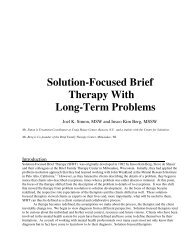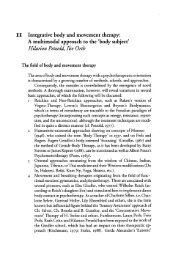Factors and Processes Contributing to Resilience
Factors and Processes Contributing to Resilience
Factors and Processes Contributing to Resilience
Create successful ePaper yourself
Turn your PDF publications into a flip-book with our unique Google optimized e-Paper software.
<strong>Fac<strong>to</strong>rs</strong> <strong>and</strong> <strong>Processes</strong> Contrlbuting <strong>to</strong> Resillence 103<br />
knowing" (Wolin, 1989) <strong>and</strong> personal insight (Flach, 1988). According <strong>to</strong><br />
Wolin <strong>and</strong> Wolin (1993), insight is the nurober one resiliency. Insight is the<br />
mental habit of asking penetrating questions of oneself <strong>and</strong> subsequently,<br />
providing honest answers. Resilient children from dysfunctional parents<br />
often are aware very early in life that they are different from <strong>and</strong> stronger<br />
than their sick parent. While empathetic <strong>and</strong> caring, they develop "adaptive<br />
distancing" <strong>to</strong> protect their sense of healthy separation from the parent's<br />
maladaptive coping skills <strong>and</strong> life patterns. This failure <strong>to</strong> identify with their<br />
dysfuncüonal parent <strong>and</strong> <strong>to</strong> find more successful role models is adaptive for<br />
these children (Beardslee & Podorefsky, 1988). Adaptive distancing has<br />
been found <strong>to</strong> be a crucial mechanism in children of alcoholics (Bennett,<br />
Wolin, Reiss, & Teitelbaum, 1987; Berlin & Davis, 1989).<br />
The capability <strong>to</strong> analyze one's psychological <strong>and</strong> physical strengths<br />
<strong>and</strong> compare them <strong>to</strong> others takes a certain Ievel of intrapersonal<strong>and</strong> interpersonal<br />
reflective skill, which not all children possess. For some reason only<br />
a few children excel in analyzing their intrapersonal skills <strong>and</strong> judging their<br />
strengths <strong>and</strong> limitations, whereas others living in similar family <strong>and</strong> peer<br />
environments are completely unaware of these psychological differences.<br />
Possibly, the early development of certain conceptual centers in the brain<br />
make this type of relational thinking possible in resilient youth.<br />
Self-Esteem <strong>and</strong> Abilily ToRes<strong>to</strong>re Self-Esteem. Resilient youth have<br />
higher self-esteem associated with an accurate appraisal of their increased<br />
strengths <strong>and</strong> capabilities. They have resilienl self-efficacy (B<strong>and</strong>ura, 1977;<br />
1989) <strong>and</strong> the ability <strong>to</strong> res<strong>to</strong>re self-esteem (Flach, 1988) after failure or disruption<br />
in homeostasis. Self-efficacy is a self-perception about competence<br />
<strong>to</strong> perform specific behavioral tasks (B<strong>and</strong>ura, 1977) <strong>and</strong> influences choice<br />
of tasks or challenges attempted, the degree of effort employed, <strong>and</strong> emotional<br />
reactions <strong>to</strong> threat of failure (Lawrence & McLeroy, 1986).<br />
Youth who avoid opportunities <strong>to</strong> master challenges because of Iow<br />
self-esteem or specific task self-efficacy will have a more difficult time developing<br />
resilience (Schunk & Carbonari, 1984). B<strong>and</strong>ura (1989) believes that<br />
overcoming stressors or taking on challenges is necessary for the development<br />
of self-efficacy. Children who are overprotected or shy in accepting<br />
challenges are bindered in developing self-efficacy <strong>and</strong> competencies. He<br />
has written: "lf people experience only easy successes, they come <strong>to</strong> expect<br />
quick results <strong>and</strong> their sense of efficacy is easily undermined by failure" (p.<br />
1179). Perseverance <strong>and</strong> determination are possible by-products of resilient<br />
self-efficacy that in turn lead <strong>to</strong> increased self-efficacy when youth are successfuJ<br />
in "sticking it out through <strong>to</strong>ugh times '' (p. 1179).<br />
Planning Ability. Another cognitive skill probably related <strong>to</strong> intelligence<br />
is planning ability, which has becn found related <strong>to</strong> resilience in high-



